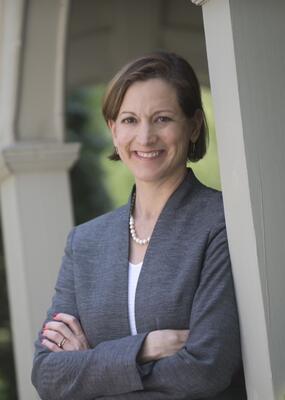
HURI: What is currently referred to as "the Ukraine crisis" has obviously turned into a European crisis, and that calls for a total reevaluation of all the established assumptions and notions. Your book "Gulag: A History" made you one of the leading experts on the former Soviet Union and the present-day Russia. Considering that after the fall of the Soviet Union in 1991, Russia has become its successor-state and appropriated most of its assets as well as its ideology, to what extent should Russia be "held responsible" for the crimes of the Soviet totalitarianism?
 Anne Applebaum: I don't think that Russia should be "held responsible" for all of the crimes of Soviet totalitarianism. But Russia - like all of the former Soviet republics - does have an obligation to its own citizens and to its neighbors to research, write and grapple with its history. Russia, as an ex-colonial power and as the dominant Soviet republic, also has an obligation to understand how it is perceived by its neighbors. Since 1991, the Russian state has made very few systematic attempts to write honest histories of Russian-Polish, Russian-Baltic or Russian-Ukrainian relations. And of course the failure to understand the past means that Russians continue to misunderstand their neighbors in the present.
Anne Applebaum: I don't think that Russia should be "held responsible" for all of the crimes of Soviet totalitarianism. But Russia - like all of the former Soviet republics - does have an obligation to its own citizens and to its neighbors to research, write and grapple with its history. Russia, as an ex-colonial power and as the dominant Soviet republic, also has an obligation to understand how it is perceived by its neighbors. Since 1991, the Russian state has made very few systematic attempts to write honest histories of Russian-Polish, Russian-Baltic or Russian-Ukrainian relations. And of course the failure to understand the past means that Russians continue to misunderstand their neighbors in the present.
HURI: When we try to make sense of the Russo-Ukrainian war, we tend to come up with some logical explanations for Putin's intentions: he invaded Crimea and eastern Ukraine to recreate the Russian empire, or prevent Ukraine's integration into Europe, or distract his domestic audience from the internal economic and political troubles, etc. But what are we to make of the popular support for this war in Russia itself and of the fact that, despite the rapidly deteriorating economic, political and financial climate there, Putin continues to enjoy high approval ratings? Is what we are seeing now an instance of a "collective madness", a result of a successful propaganda campaign or do Putin's policies really resonate with people who are simply showing national unity in the face of the perceived external threat?
Anne Applebaum: It is clear that the occupation of Crimea did stir some atavistic feelings among Russians: The idea that conquest equals power equals pride was drummed into people over many decades, and doesn't disappear quickly. Russian television now operates almost entirely in the realm of emotions, and that's had an important impact.
At the same time, it's hard for me to take these approval ratings seriously. Imagine that you are a factory worker in Chelyabinsk, and someone calls you up and says, "I'm a pollster, what do you think of President Putin?" In the current climate of fear and mistrust, of course you will say that you approve. In general, I think that "support' for the current regime is very shallow, and could disappear very quickly.
HURI: Given Ukraine's reliance on Russian energy supplies, its history of rampant, pervasive corruption, and the fact that Moscow still has a variety of tools it can use to exert influence on Ukraine, how realistic is it to expect Ukraine to take charge of its own future and become a truly functioning democracy with a stable market economy?
Anne Applebaum: I really don't know the answer to this question. Over the past few months, I have been very impressed by the Ukrainian officials that I've met. They are serious, dedicated, and patriotic. They really want things to change. Ukraine also has an impressive and well organized civic movement: there are many groups which have developed ways to fight back against disinformation, to highlight corruption, to report the news.
Obviously, the challenges are enormous. Russia is trying to undermine Ukraine with terrorism, including bomb attacks in Odessa and Kharkhiv, as well as economic boycotts and pressure. The levels of corruption in ministries and in the private sector are profound. Other countries have overcome similar challenges, and if Ukraine is willing to learn from the experiences of others it can succeed. But I can't predict what will happen.
HURI: In one of your articles you said that the West now has to design a comprehensive, long-term strategy to reinforce Ukrainian statehood and, over many years, integrate Ukraine into Europe. What do you think this long-term strategy should look like?
Anne Applebaum: A long-term strategy would have defensive elements - training for Ukrainian army and police, defensive weapons, help with border control and anti-terrorism - as well as economic and political elements. Ukraine should be offered a clear path, if not to EU membership then at least to a form of enhanced association. Ukrainians should be integrated into EU educational programs such as the Erasmus scholarships, should have visa-free access to the EU, and should have a special status in EU institutions and organizations. I think the West needs a comprehensive information policy, and it should be centered on Ukraine: we should support both Ukrainian and Russian-language media, publishing and education. Ukraine has already been offered an IMF program, but also needs direct investment. I would love to see major Western companies investing in Ukraine, as they have done in Russia. The EU, the US and Canada should do their best to create the conditions that could make this happen. A real integration strategy would have a wide range of elements.